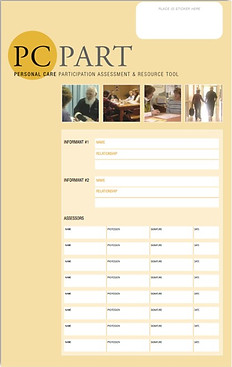Home Support Needs Assessment (HSNA)
Background
The origins of the HSNA can be traced back to the development of the Handicap Assessment and Resource Tool (HART) in 1994, with an article published about it’s development in 2000 (Vertesi et al., 2000). The HART was created to align with the conceptual framework of the International Classification of Impairment, Disability and Handicap (ICIDH), which was the prevailing model at the time. The primary aim of the ICIDH was to assess the impact of disability on individuals’ ability to participate in daily life, using the term handicap to describe these limitations.
In 2001, the World Health Organization introduced the International Classification of Functioning, Disability and Health (ICF), which replaced the ICIDH. This new framework shifted the focus from deficits to a more holistic view of functioning and health. The term handicap was replaced with participation restriction, defined as “problems an individual may experience in involvement in life situations.”
To reflect this conceptual shift, the HART was revised and renamed the Personal Care Participation Assessment and Resource Tool (PC-PART) (Darzins, P., 2004). While the core structure of the tool remained largely unchanged, updates were made to its layout, presentation, and the phrasing of some items to align with ICF terminology and principles.
From 2013 to 2016, several validation studies investigating the measurement properties of the PC-PART were conducted by Susan Darzins for her doctoral research. Learnings from this research led to further revision, resulting in the Home Support Needs Assessment (HSNA) in 2018.
The PC-PART documents are available for download here:

People’s unmet support needs are conceptually aligned with the notion of participation restrictions, as defined in the International Classification of Functioning, Disability and Health (ICF) (World Health Organization, 2001), which refers to problems an individual may experience in involvement in life situations. This concept is one of the three core components of the ICF framework, alongside impairments (problems in body function or structure) and activity limitations (difficulties in executing tasks or actions).
Participation encompasses a wide range of life areas from the Activities and Participation ICF domains:
-
Learning and applying knowledge
-
General tasks and demands
-
Communication
-
Mobility
-
Self-care
-
Domestic life
-
Interpersonal interactions
-
Education
-
Employment
-
Community and civic life
Participation restrictions are shaped by the interaction between the individual’s health status and contextual factors, including environmental and personal factors.